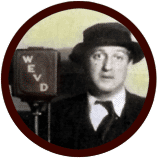Non-English broadcasting also gets overlooked by most radio bloggers, including myself. This is a big shortfall when you consider the scope and significance of Spanish language radio on the west coast, Florida, and elsewhere.
Having kicked myself and promised to make amends, I am enjoying Kelman’s account of how complicated Yiddish radio was in the 1930s, particularly when broadcast on New York City’s historic radio frequency: WEVD, named after the socialist leader Eugene Victor Debs (see my post on late-WEVD talk radio host Ed Koch). The station showed a “less than appreciative attitude” toward Yiddish radio shows during that decade, Kelman notes, yet it put them on the air, making the signal the “most beloved outlet for Yiddish radio in America.”
Established in 1927, WEVD almost mismanaged itself into extinction over the next four years. Finally the Jewish Daily Forward newspaper came, well, forward, with considerable monetary backing for the station. The signal’s principals then made a case for renewal to the government: sure, a brief acknowledged, the station would offer programs to minorities, but bottom line: “WEVD is a public forum open to the presentation of all viewpoints in matters of public interest.”
With that settled, a host of ethnic programs the media outfit had inaugurated in the 1920s received lower priority. The original multiethnic lineup included series like Seeing the Irish Cities, Hits and Bits of Scotch, and the Nestle Colored Club Art Hour. Now talk shows featuring the philosopher John Dewey and socialist leader Morris Hillquit took the evening stage, followed by lectures from Clarence Darrow and Bertrand Russell. “Gone were the more entertaining ethnic programs in favor of a more serious, more studious program schedule,” Kelman notes.
Yiddish programming continued to flourish at WEVD, but the station’s manager broadcast it during the day, not during the all-important evenings, when working class families listened around the dinner hour (“drive time” radio had yet to be invented). “Management considered Yiddish “a second-class language and hardly recognized either the growing creativity or contribution of Yiddish programming,” Kelman writes. And yet it was the Yiddish content that drew commercial sponsorships, allowing the station to support itself. Here’s is the author’s description of WEVD’s Yiddish lineup:
By mid-decade, WEVD had introduced Marc Scheid’s radio adaptation of the popular newspaper column, the Bintl briv (Bundle of Letters), Nukhem Stutchkoff’s first family dramas, dramatizations of Yiddish literature, and countless musical performances. It boasted a schedule of nearly twenty-five hours of Yiddish programming each week, supported by a healthy roster of sponsors.
Despite this, when the station moved to better digs in 1938, guests for the ceremony noted WEVD’s contributions to education and politics, “but none mentioned Yiddish.”
What are we to make of this interesting story? Why did the Jewish Daily Forward deprioritize Yiddish programming while depending on it for needed station income? Doubtless pressure from the emerging Federal Communications Commission played a role. Perhaps a desire for greater social legitimacy, informed by the “highbrow” versus “lowbrow” cultural assumptions of the period, also influenced WEVD’s policies.
Whatever the reasons, Kelman’s fine book reminds us that from the dawn of radio, community based stations have had to make difficult decisions about their audiences and the languages that they spoke. To this day, they still do.



